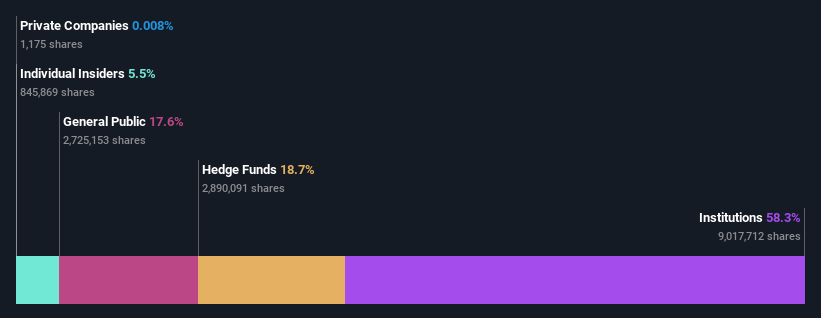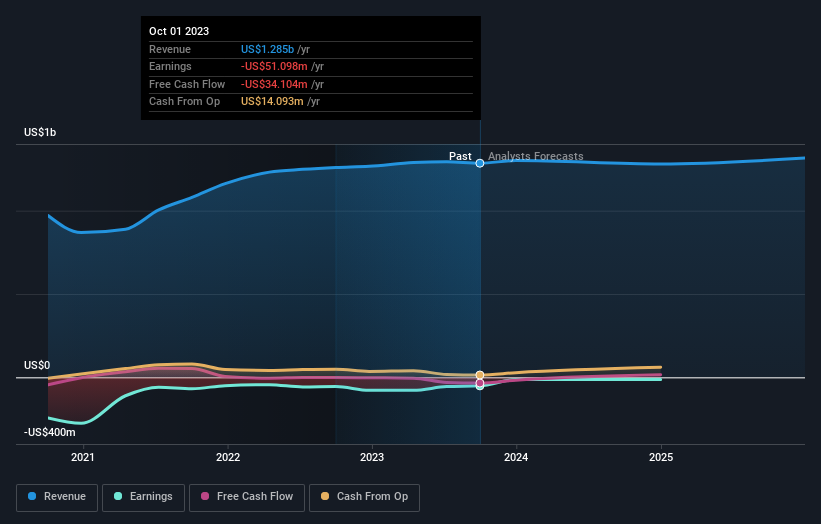- United States
- /
- Hospitality
- /
- NasdaqGS:RRGB
Red Robin Gourmet Burgers, Inc.'s (NASDAQ:RRGB) large institutional owners must be happy as stock continues to impress, up 13% over the past week

Key Insights
- Significantly high institutional ownership implies Red Robin Gourmet Burgers' stock price is sensitive to their trading actions
- A total of 9 investors have a majority stake in the company with 51% ownership
- Using data from analyst forecasts alongside ownership research, one can better assess the future performance of a company
If you want to know who really controls Red Robin Gourmet Burgers, Inc. (NASDAQ:RRGB), then you'll have to look at the makeup of its share registry. With 58% stake, institutions possess the maximum shares in the company. That is, the group stands to benefit the most if the stock rises (or lose the most if there is a downturn).
And as as result, institutional investors reaped the most rewards after the company's stock price gained 13% last week. The gains from last week would have further boosted the one-year return to shareholders which currently stand at 39%.
Let's take a closer look to see what the different types of shareholders can tell us about Red Robin Gourmet Burgers.
Check out our latest analysis for Red Robin Gourmet Burgers

What Does The Institutional Ownership Tell Us About Red Robin Gourmet Burgers?
Institutions typically measure themselves against a benchmark when reporting to their own investors, so they often become more enthusiastic about a stock once it's included in a major index. We would expect most companies to have some institutions on the register, especially if they are growing.
We can see that Red Robin Gourmet Burgers does have institutional investors; and they hold a good portion of the company's stock. This can indicate that the company has a certain degree of credibility in the investment community. However, it is best to be wary of relying on the supposed validation that comes with institutional investors. They too, get it wrong sometimes. If multiple institutions change their view on a stock at the same time, you could see the share price drop fast. It's therefore worth looking at Red Robin Gourmet Burgers' earnings history below. Of course, the future is what really matters.

Institutional investors own over 50% of the company, so together than can probably strongly influence board decisions. Our data indicates that hedge funds own 19% of Red Robin Gourmet Burgers. That's interesting, because hedge funds can be quite active and activist. Many look for medium term catalysts that will drive the share price higher. Looking at our data, we can see that the largest shareholder is Archon Capital Management LLC with 12% of shares outstanding. BlackRock, Inc. is the second largest shareholder owning 6.8% of common stock, and Soviero Asset Management, LP holds about 6.6% of the company stock. Additionally, the company's CEO Gerard Hart directly holds 0.8% of the total shares outstanding.
We did some more digging and found that 9 of the top shareholders account for roughly 51% of the register, implying that along with larger shareholders, there are a few smaller shareholders, thereby balancing out each others interests somewhat.
While studying institutional ownership for a company can add value to your research, it is also a good practice to research analyst recommendations to get a deeper understand of a stock's expected performance. Quite a few analysts cover the stock, so you could look into forecast growth quite easily.
Insider Ownership Of Red Robin Gourmet Burgers
The definition of an insider can differ slightly between different countries, but members of the board of directors always count. The company management answer to the board and the latter should represent the interests of shareholders. Notably, sometimes top-level managers are on the board themselves.
Most consider insider ownership a positive because it can indicate the board is well aligned with other shareholders. However, on some occasions too much power is concentrated within this group.
We can see that insiders own shares in Red Robin Gourmet Burgers, Inc.. It has a market capitalization of just US$155m, and insiders have US$8.5m worth of shares, in their own names. This shows at least some alignment, but we usually like to see larger insider holdings. You can click here to see if those insiders have been buying or selling.
General Public Ownership
The general public-- including retail investors -- own 18% stake in the company, and hence can't easily be ignored. This size of ownership, while considerable, may not be enough to change company policy if the decision is not in sync with other large shareholders.
Next Steps:
It's always worth thinking about the different groups who own shares in a company. But to understand Red Robin Gourmet Burgers better, we need to consider many other factors. Case in point: We've spotted 2 warning signs for Red Robin Gourmet Burgers you should be aware of.
If you are like me, you may want to think about whether this company will grow or shrink. Luckily, you can check this free report showing analyst forecasts for its future.
NB: Figures in this article are calculated using data from the last twelve months, which refer to the 12-month period ending on the last date of the month the financial statement is dated. This may not be consistent with full year annual report figures.
New: AI Stock Screener & Alerts
Our new AI Stock Screener scans the market every day to uncover opportunities.
• Dividend Powerhouses (3%+ Yield)
• Undervalued Small Caps with Insider Buying
• High growth Tech and AI Companies
Or build your own from over 50 metrics.
Have feedback on this article? Concerned about the content? Get in touch with us directly. Alternatively, email editorial-team (at) simplywallst.com.
This article by Simply Wall St is general in nature. We provide commentary based on historical data and analyst forecasts only using an unbiased methodology and our articles are not intended to be financial advice. It does not constitute a recommendation to buy or sell any stock, and does not take account of your objectives, or your financial situation. We aim to bring you long-term focused analysis driven by fundamental data. Note that our analysis may not factor in the latest price-sensitive company announcements or qualitative material. Simply Wall St has no position in any stocks mentioned.
About NasdaqGS:RRGB
Red Robin Gourmet Burgers
Develops, operates, and franchises casual-dining restaurants, in North America and one Canadian province.
Undervalued slight.

